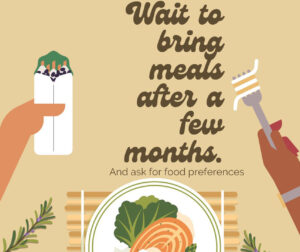Let’s Think Differently About How To Help A Widow
I think that so often we are taught by the people and culture around us to help those grieving losses in the same predictable ways. Condolence cards, meals, calls and visits early on. Asking intrusive questions about the widow’s financial state, cleaning the widows home in your way, but not her way. If each person grieving is one of a kind, and each relationship is its own special, unique identity, then shouldn’t we realize that each person needs to be helped in a way equally as unique that works for them?
Helping a hurting loved one is not a check list to accomplish and then you are done and able to feel like a very “good person” for that day. Helping a hurting loved one requires sincere compassion, and the willingness to listen and be in tune with that wounded heart. It requires patience and humility and a spirit of gentleness. It involves asking and not assuming. Listening instead of telling and being willing to admit that you truly don’t know what the person is feeling because you aren’t that widow and you weren’t in that marriage. And let us never forget that a helping person would be wise to remember that while they are able to leave the situation of sorrow and drive home to their normal routine which was untouched and unchanged, their widowed friend is sitting in the middle of the rubble of a shattered life that she doesn’t recognize anymore that will NEVER be the same again.
So how can we think differently about how to better assist and support our widowed loved ones?
1) Don’t just send the condolence card, but write a handwritten note in the card with a special memory about her husband or a personal note conveying your care and concern for her. Better yet, include in the card that you plan to call to follow up in a few weeks once things settle. Then….Go put it on your calendar and actually remember to call her.
2) Instead of EVERYONE bringing a prepared meal in the literal days and early weeks following her husband’s death. Why not, wait, contact her and in a few weeks or months say, “it was on my heart to cook a meal for you. What do you and the kids like to eat? When would it be helpful to bring a meal? I remember very early so many meals came in, and I was in such a state of shock and raw pain that I truly didn’t feel like eating. The food I forced in seemed to lose its flavor. Many meals came in, and I just couldn’t keep up with the supply. Food wasted. My freezer quickly filled. A few months later I became more independent and life was beginning to overwhelm me. The idea of cooking meals that I couldn’t prepare for my husband or cook with my husband was a struggle. It made me incredibly sad. It was several months after his death that healthy, tasty meals prepared by others was a huge need and blessing.
3) Visit later. Don’t force yourself into the fresh rawness and into the living rooms of widows to talk about the weather, your knee surgery, baseball or any other general topic. I remember hating the early visits. People I wasn’t truly close with asking me so many questions. Me feeling so incredibly tired of talking, and of all the times in my life when I didn’t want to entertain or make small talk, this was it. I probably should have done a better job politely declining early on because I didn’t have much to say and I was a mess. My closest loved ones whom were actually staying with me carried the weight of most conversations. Months down the road when the shock wears off and the loneliness sets in, now that’s a great time for a visit. Few seem to remember to extend themselves to the widow after the first few months have passed but often that’s when she needs it most.
4) Cleaning! My dear sweet loved ones were so grieved by his death and so saddened for me and my children that it seemed they didn’t know what to do to help, but they had to do something to cope with their own feelings. So they mowed my law. They picked up groceries. They cleaned my house. But WARNING……. To all you eager house cleaners longing to help your dear widowed loved one. Be VERY careful how you clean. You might be throwing away the last batch of “Daddy’s special family movie night popcorn with treats”, (as it was with our family). Or trying to recycle the last soda can he ever left on the counter or washing the last clothing he wore that your widowed friend desperately wants to keep to try maintain as much of “his smell” as possible. If you are in the widow’s very private home, sorting through or cleaning, then realize that everything is probably special to her and raw and painful to her. Ask questions before cleaning, moving, or throwing things away.
5) Don’t ask very blunt, or publicly nosy questions about this widow’s finances. If you have a sincere intention to help financially, make that known in a private written note. Your widowed friend doesn’t want to feel like “the less fortunate.” or that person “a special church project” or someone who “can’t make ends meet.” If it is very early, she may not truly know her financial situation as her husband’s life insurance and other assets have yet to be processed. Her widow brain is a train wreck and she may be too overwhelmed to know her financial details right now.
6) Let her talk about her husband. I can’t tell you how frustrating it is to want with all your heart to tell a loved one a story about your sweetheart and then for them to obviously get anxious and to try to redirect the conversation away from him. It always makes me feel like they are treating me like a small child and like they truly don’t care about the memory I was trying to share. If your widowed loved one decides to share with you about her husband, then that means they have identified you as a safe or trusted place to be worthy of hearing a part of their love story and a part of her pain. Consider yourself honored and just simply listen. Don’t let your fear of saying the wrong thing keep you from hearing and caring in these important moments.
So what do you think my dear fellow widows?
Are there ways you wish others would help you differently?
In Hope & Prayers,
This Widow Mama






perfect! hugs!!
I send hugs back. Thanks for commenting.!